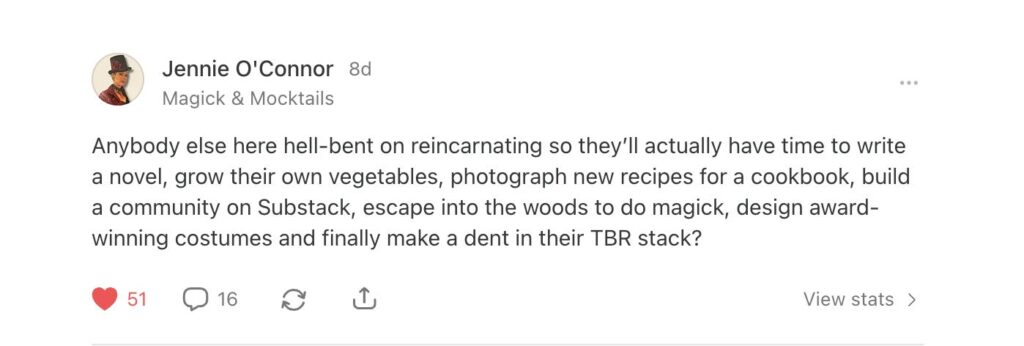If you consider yourself a “doer” who is always racing the clock, you might think the answer to all your problems is optimization.
Life hacks.
A time management system so effective it will finally let you do it all.
I’ve both bought into and sold the idea that you can do every little thing your heart desires if only you organize, streamline and discipline yourself enough.
The problem with optimization, however, is that the more time you manage to free up, the longer the list gets of what needs doing. The more focused you become on optimizing your time, the less likely you are to relax and simply let time unfold.
And it doesn’t help that the gurus on Insta say you should create content daily and repurpose it 74 times for every social media platform that exists—or else perish in an entrepreneurial dumpster fire.
Do more is hustle culture’s mantra.
The low-grade perma-anxiety it gives us is the energy that capitalism feeds on. Our quest to be more productive because that’s what ambitious people do has become toxic.
And it’s burning us out.
In response, I’d like to propose something counterintuitive. Quit the hacks, delete your habit tracker and throw out your morning routines. To do this, you will have to change your mindset. And for a high achiever, this will feel uncomfortable. It might even make you squirm.
That’s the point.
Escaping toxic productivity isn’t about finding new ways to squeeze more out of yourself. It’s about confronting some brutal truths that your enterprising brain would rather ignore. Let’s unpack them.
Your To-Do List Will Never be Done
As a Type A, overachieving multipotentialite, I’m the poster child for biting off more than I can chew. As of this writing, my task manager lists 308 tasks. My habit tracker? 30 habits. And my morning routine—which, let’s be real, could take the entire day—has 20 action items.
So how’s it working out?
Hahahahahahahahahahahahahaha.
Here’s what I’ve come to realize. That sense of peace I think I’ll have once I manage to wrangle this Dr. Seussian tower of (largely self-imposed) obligations?
It’s not coming.
Thinking we can gain mastery over time via our To-Do lists is an attempt to avoid the helplessness that comes from realizing we can’t. We think if we refuse to acknowledge that tough choices have to be made about how we spend our time, we can escape feeling the pain of our limitations.
The solution, I’ve discovered, is to laugh at ourselves (see above) and then stop trying to win. It’s a recipe for disappointment, and letting ourselves down every day of our lives is bad for morale.
After letting go of your aspirations to dominate your To-Do list, I think you’ll find it feels strangely peaceful. When you finally accept that your goal is impossible, it’s hard to keep beating yourself up for failing at it.
You Have to Start Ugly
In the same way, you can apply this idea to perfectionism. If you’re constantly tweaking a project because you’re worried it’s not yet good enough, you can relax. Because, judging by the flawless standards of your imagination, you definitely won’t ever think it’s good enough.
So, what should you do?
Make a start.
Every successful entrepreneur will tell you they started ugly and figured things out as they went. They made mistakes—undoubtedly, many—but they kept going. Waiting until you feel prepared only delays the fact that building an audience, gaining traction and establishing yourself takes time. If you keep waiting, you’ll wake up years from now with your best ideas still locked inside you.
Instead, embrace imperfection, normalize small failures and remember that genuine enthusiasm beats flawlessness every time. Your passion and authenticity will attract the right people—even if you change directions later. This way, by the time you actually do feel ready, your audience will already be there waiting to cheer you on.
You’re Saying “No” Wrong
You may have heard that the key to safeguarding your time is by saying no more often, but this is often misunderstood. People think it means saying no to opportunities where they feel a sense of obligation rather than desire. In other words, they think it means quit overcommitting yourself just to look good to the other PTA parents.
But it actually means saying no to the good stuff—the fascinating, the pleasurable, the things that could be great fun—because they aren’t the most important thing right now.
This is a bitter pill to swallow for the multipassionates among us. Saying no to things I don’t want to do is easy. But declining the sparkly, the awe-inspiring, the curiosity-inducing because I’m a limited human with finite time? That doesn’t sit well.
It might be the reason I’m such a fan of the idea of reincarnation:

Yet, here is another instance where embracing our limitations actually makes our choices more impactful.
Multipassionates don’t have to follow the antiquated advice to “choose one thing.” But we also can’t choose everything. A decision is made all the more meaningful when held up against the number of extremely inviting choices we have to turn down in order to make it.
Work/Life Balance is a Lie
I once got into a heated debate with a New York businessman who bragged about his 80-hour work weeks while scoffing at Californians and our obsession with “working out and hangin’ at the beach.” Looking back, I think we both got it wrong. 80-hour work weeks are hustle culture at its most toxic, but the endless pursuit of work/life balance isn’t realistic either.
The truth is that humans are built for seasons. It’s how civilization endured for centuries, and it continues to apply in modern times, even though we have industrialized ourselves away from this natural tendency.
In today’s terms, it means you may have a season where the book you’re writing is taking an inordinate amount of your time—time you are quietly chiding yourself should be spent with your kids. Or maybe a big project at work means overtime and frozen burritos for dinner while your gym membership languishes, silently mocking you.
Embracing seasonality means accepting that bursts of productivity in one area almost certainly mean neglecting other areas of life we deem important. In fact, it may mean you give all those other areas a C effort for now—and call it good.
It also means that these intense creative/work seasons should be followed by rest. And that means REAL rest, not “optimized downtime” or the “productive rest” a lot of us fool ourselves into thinking counts as the same thing.
In other words, it’s okay to have lopsided priorities for a season, so long as you’re mindful about spending the next season making up for lost time with your loved ones or getting back into your workout routine. It means you don’t have to be a perfect creator, a perfect parent or a perfect employee 24/7.
I’ll say it louder for the high-achievers in the back: Give yourself some grace.
Nobody Cares About Your Legacy
Not everyone is Taylor Swift or Steve Jobs or Marie Curie. But it has taken me 46 revolutions around the sun to realize that not everyone needs to be. The pressure to be exceptional—to leave a dent in the world that lasts generations—is a misrepresentation of what a fulfilling life actually is.
It’s enough to move, delight or inspire a handful of people in your time. Read that again.
Your life is not a monument; it is an experience. And the experience is where the meaning comes from. Everything else is external validation, comparisonitis and egocentricity tricking us into believing our work and our choices are defining moments of history.
Stepping back and recognizing your smallness might, at first, feel a little bit depressing. But once your ego gets over the idea that nobody really cares all that much, the reality is quite freeing. It lowers the impossible standard of what a “well-spent” life looks like and allows more of what you might have previously deemed insignificant to count as meaningful.
Final Thoughts
Escaping toxic productivity isn’t about getting better at gaming the system; it’s recognizing that no degree of efficiency will ever create enough space for everything you want to do. It’s accepting that no amount of tweaking will ever result in perfection, and saying no to good things is the price of doing something great. Dumping hustle culture is all about embracing the ebb and flow of life rather than chasing the illusion of balance—and accepting that your impact doesn’t have to be legendary to be meaningful.
So let this be your permission slip to use your habit tracker as kindling and your To-Do list as a suggestion. Let good enough be good enough, stop optimizing every second, and, for the love of dopamine, stop measuring your worth by how much you produce.
Because when you look back on the best moments of your life, the time you spent checking boxes won’t be among them.

Did this call you out?
What are you ready to stop optimizing?
Let’s unlearn hustle culture together.
This post was originally published on Substack.
This page may contain affiliate links. Any sales made through this link will reward me a small commission—at no extra cost to you. See the affiliate disclosure here.
